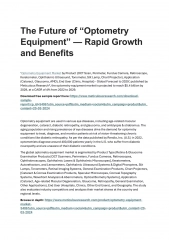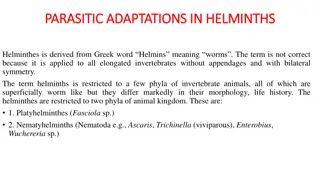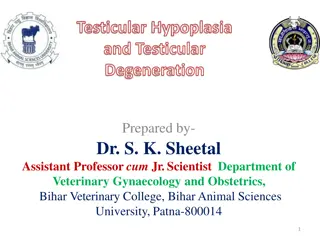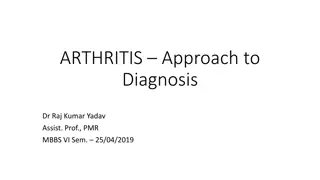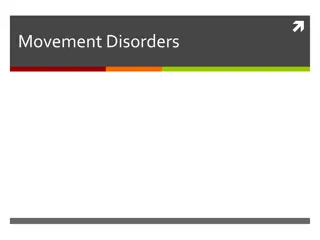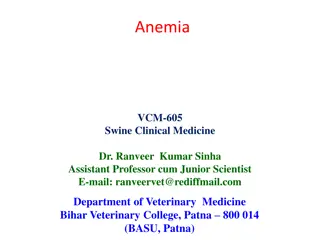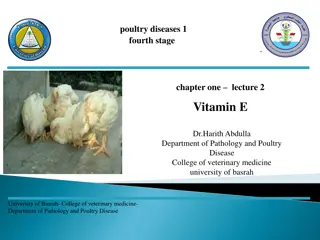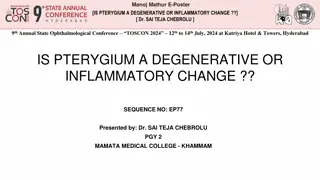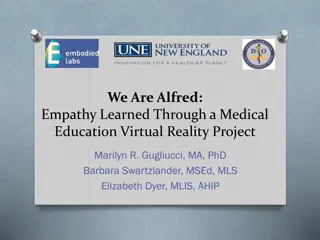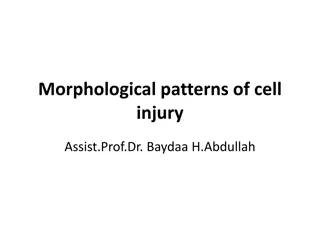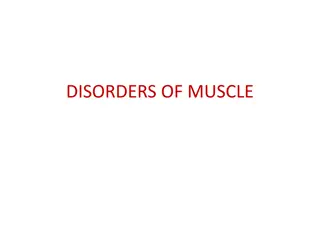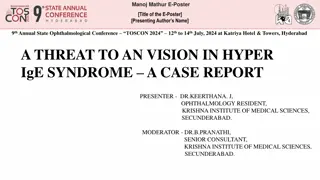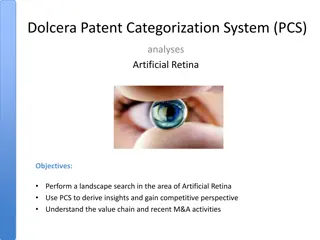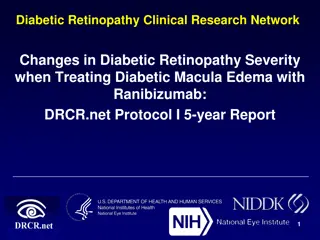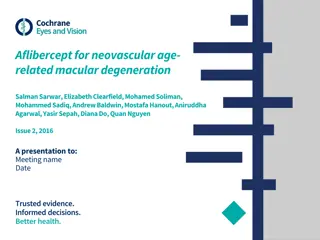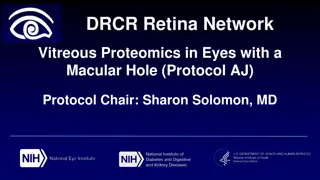Optometry Equipment Market
The adoption of optometry equipment is increasing due to the increasing number of people with vision impairments and other eye diseases such as macular degeneration and glaucoma. Furthermore, optometry equipment is used for vision therapy, low vision rehabilitation, and performing surgical procedure
2 views • 2 slides
Optometry Equipment Market
optometry equipment to diagnose various ophthalmic diseases and disorders. The adoption of optometry equipment is increasing due to the increasing number of people with vision impairments and other eye diseases such as macular degeneration and glaucoma. Furthermore, optometry equipment is used for v
1 views • 2 slides
Understanding Downer Cow Syndrome (DCS) in Cattle
Downer Cow Syndrome (DCS) is characterized by the inability of cows to rise, commonly seen around calving. It is associated with metabolic disorders, physical injuries, and prolonged recumbency. Risk factors include poor housing conditions and health issues like mastitis. Clinical signs range from d
2 views • 13 slides
Understanding Frontotemporal Dementia: A Case Study of Margaret
Margaret, a 61-year-old woman, is exhibiting symptoms suggestive of behavioral variant frontotemporal dementia (FTD). Her changing personality, inappropriate behavior, and memory issues are signs of FTD. This type of dementia involves frontal and temporal lobe degeneration, leading to alterations in
1 views • 32 slides
Adaptations in Helminth Parasites: Structural and Morphological Changes
Helminth parasites exhibit adaptations for successful living within hosts, involving structural modifications such as degeneration and new organ formation. Parasitism has evolved over time, leading to a dependent relationship between parasites and hosts. The adaptations in locomotory, digestive, and
1 views • 19 slides
Understanding Strength-Duration (SD) Curve: A Neuromuscular Diagnostic Test
Strength-Duration (SD) curve is a diagnostic test assessing neuromuscular integrity by measuring the relationship between stimulus strength and duration. It helps in electro-diagnosis of peripheral nervous system disorders and evaluates nerve degeneration and regeneration. The curve is obtained by p
2 views • 17 slides
Understanding Testicular Hypoplasia and Degeneration in Veterinary Medicine
Testicular hypoplasia and degeneration are conditions affecting the development and function of the testes in animals, particularly bulls. Hereditary and non-hereditary forms exist, leading to partial or complete failure in spermatogenic epithelium development. The incidence is low and sporadic, mor
0 views • 30 slides
Detecting Eye Diseases Early with OCT Eye Scan
Take care of both your vision and health with an OCT eye scan, which can detect diseases like Diabetes, Glaucoma, and Age-Related Macular Degeneration. Learn how this simple procedure works and why it's important to prioritize your eye health. Say yes to the OCT health check for your extraordinary e
0 views • 13 slides
Understanding Arthritis: Diagnosis and Pathophysiology
Joint pain can result from various factors such as inflammation, cartilage degeneration, crystal deposition, infection, or trauma. Different pathophysiologic processes necessitate clinical evaluation and identification through history, physical examination, and understanding of joint disease types.
2 views • 49 slides
Understanding Movement Disorders and Parkinson's Disease
Movement disorders encompass a range of conditions like myoclonus, chorea, hyperkinetic tremor, dystonia, and more. Definitions of terms like bradykinesia, rigidity, and parkinsonism help in understanding these disorders better. Parkinson's disease, a common condition associated with parkinsonism, i
0 views • 15 slides
Anemia in Swine: Causes, Clinical Signs, and Treatment
Anemia in swine can be caused by factors such as gastric ulcers, internal bleeding, and poor nutrition. Clinical signs include pale skin, rapid breathing, and jaundice. Piglet anemia, a highly fatal disease, is marked by decreased hemoglobin levels and liver degeneration. Diagnosis involves examinin
0 views • 11 slides
Causes Behind the Decline of the Mughal Empire
The decline of the Mughal Empire was influenced by weak successors after Aurangzeb, degeneration of Mughal nobility, inefficiency of the army, economic bankruptcy, foreign invasions, wars of succession, and court factions. The empire faced challenges such as incompetent rulers, weakened military, fi
2 views • 5 slides
Understanding Degenerative Spine Disease and Disc Degeneration
Degenerative spine disease is a prevalent condition affecting millions, leading to substantial healthcare costs. The anatomy and physiology of spine degeneration involve the three-joint complex theory. Pathologically, disc degeneration impacts the nucleus pulposus and annulus fibrosis, contributing
0 views • 37 slides
Understanding Azoturia in Horses: Causes, Symptoms, and Treatment
Azoturia, also known as exertional rhabdomyolysis or tying-up syndrome, is a multifactorial myopathy that mainly affects draft horses. It is characterized by stiffness in gait, reluctance to move, lameness, and myoglobinuria. The disease typically occurs during exercise after a period of rest and ca
0 views • 14 slides
Understanding Chronic Wasting Disease (CWD)
Chronic Wasting Disease (CWD) is a transmissible spongiform encephalopathy affecting cervids and other animals. The disease was first identified in the mid-1960s and has since been a concern in wildlife populations. CWD is caused by a mutated prion protein that leads to neurological degeneration. Wh
0 views • 19 slides
Dual Identities: A Reflection on Duality in Dr. Jekyll and Mr. Hyde
Explore the complexities of human nature through the contrasting personas of Dr. Jekyll and Mr. Hyde, as depicted in the classic tale. Delve into themes of duplicity, moral degeneration, and societal influences. Engage in thought-provoking discussions on the impact of nature versus nurture and the c
0 views • 6 slides
Understanding Cell Injury and Degeneration in Response to Various Stressors
Cell injury can result from multiple stressors such as hypoxia, physical agents, chemicals, microbes, immunologic factors, nutritional imbalances, and aging. This can lead to reversible changes (degeneration) or irreversible changes (necrosis). Types of degeneration include cloudy swelling, hydropic
0 views • 22 slides
Understanding Vitamin E Deficiency in Poultry: Symptoms and Implications
Vitamin E deficiency in poultry can lead to serious conditions such as encephalomalacia (crazy chick disease) and exudative diathesis. Symptoms include ataxia, testicular degeneration, and early embryo mortality. Post-mortem lesions show soft and swollen brains with minute hemorrhages. It is crucial
0 views • 14 slides
Understanding Menstruation and Ovulation Cycle in Women
Menstruation, the cyclic uterine bleeding, is a result of hormonal interplay. It signifies ovarian events controlled by the hypothalamic-pituitary axis. The menstrual cycle, spanning from one period to the next, involves the release of ova and hormones like estrogen and progesterone. Menstruation ty
0 views • 49 slides
Understanding Pterygium: Degenerative or Inflammatory Change?
Pterygium, a common ocular surface lesion, has historically been considered degenerative due to factors like UV radiation exposure. However, recent research suggests an inflammatory component with cellular proliferative fibrosis and angiogenesis. This study presented at TOSCON 2024 delves into the h
0 views • 6 slides
Enhancing Healthcare Services in Aneurin Bevan University Health Board
Aneurin Bevan University Health Board is dedicated to providing accessible care closer to home, with specialized centers for glaucoma and wet age-related macular degeneration (AMD). Their innovative service model has increased capacity, reduced waiting times, and improved patient satisfaction, with
0 views • 7 slides
Understanding Bovine Spongiform Encephalopathy (BSE) - The Mad Cow Disease
Subacute or chronic fatal neurodegenerative disease in adult cattle, Bovine Spongiform Encephalopathy (BSE) is a transmissible spongiform encephalopathy with spongy degeneration in the CNS. It is caused by an infectious protein called prion and is mostly found in Europe, with potential zoonotic impa
0 views • 22 slides
We Are Alfred: Enhancing Empathy in Medical Education through Virtual Reality
This project focuses on utilizing virtual reality to educate medical students about caring for older adults, particularly those with Macular Degeneration. By immersing students in the experiences of a patient named Alfred, significant increases in empathy and understanding were reported, highlightin
0 views • 11 slides
Idaho Talking Book Service 2017 Evaluation Results
Idaho Talking Book Service (TBS) serves around 3,000 patrons, primarily older individuals who lost vision late in life, often due to macular degeneration. In 2017, a telephone survey was conducted with 1,461 respondents, revealing details about the patrons, their satisfaction with the service, and h
0 views • 26 slides
Morphological Patterns of Cell Injury and Degeneration
This informative content discusses morphological patterns of cell injury, focusing on reversible cell injury or degeneration caused by intracellular and interstitial accumulations. It covers classifications such as primary changes in the cell, intracellular accumulation of water, fat, carbohydrates,
0 views • 18 slides
Overview of Muscle Disorders and Muscular Dystrophies
The human body consists of over 600 muscles, divided into skeletal, smooth, and cardiac muscles. Diseases of skeletal muscle encompass myopathy, myositis, and muscular dystrophy. Muscle disorders are categorized into genetic muscular dystrophies, channelopathies, inflammatory myopathies, and endocri
0 views • 32 slides
Comprehensive Guide to Physiotherapy Management of PSP and CBD by Specialist Physiotherapist in Parkinson's Team
Specialist Physiotherapist, Helen Carten, from the Parkinson's Team at NHS Ayrshire and Arran, shares insights on the role of physiotherapy in managing Progressive Supranuclear Palsy (PSP) and Corticobasal Degeneration (CBD). The article covers the importance of maximizing function and quality of li
0 views • 15 slides
Best Bone Fracture Treatment in Novena
Are you looking for the Best Bone Fracture Treatment in Novena? Then contact Centurion Orthopaedic Centre. They are experts in diagnosing and treating a wide range of knee, shoulder, hip, and ankle problems, including injuries and degeneration. Their
0 views • 6 slides
Vision Threat in Hyper IgE Syndrome: A Case Report
Hyper IgE Syndrome (HIES) is a rare primary immunodeficiency characterized by elevated IgE levels and recurrent infections. Ocular involvement in HIES is uncommon, with reported cases of various eye conditions such as conjunctivitis and retinal detachment. A 17-year-old male with HIES presented with
0 views • 6 slides
Evolution of Word Meanings: A Linguistic Perspective
Explore how words evolve in meaning over time, touching upon the concepts of semantics, narrowing of meaning, degeneration, and regeneration. Discover how the same word can hold different connotations for various individuals. Delve into examples of semantic changes through linguistic shifts such as
0 views • 5 slides
Understanding the Difference Between Learning and Performance in Sports Science
Learning in sports refers to a relatively permanent change in performance through experience, excluding maturation and degeneration, while performance is a temporary occurrence that fluctuates over time. Coaches must consider these differences when designing training sessions for improving both perf
0 views • 48 slides
Insights into Artificial Retina Technology through Dolcera Patent Categorization System
The Dolcera Patent Categorization System (PCS) analyzes the field of Artificial Retina, focusing on innovations to tackle blindness caused by conditions like macular degeneration and retinitis pigmentosa. The system conducts a landscape search using keywords related to Artificial Vision and Retinal
0 views • 12 slides
Long-Term Effects of Ranibizumab Treatment on Diabetic Retinopathy Severity: DRCR.net Protocol I 5-Year Report
Phase 3 trials have demonstrated favorable changes in diabetic retinopathy severity in eyes treated with ranibizumab for diabetic macular edema. This study focuses on the 5-year outcomes of ranibizumab therapy in managing diabetic retinopathy progression, especially with decreasing exposure to anti-
0 views • 24 slides
Effectiveness of Aflibercept for Neovascular Age-Related Macular Degeneration
This study compares the effectiveness and safety of intravitreal injections of aflibercept versus ranibizumab and bevacizumab for patients with neovascular age-related macular degeneration (AMD). Results show similar visual acuity outcomes and achievement of dry retina between aflibercept and ranibi
2 views • 14 slides
Vitreous Proteomics in Macular Hole Patients Study
This study aims to investigate vitreous proteomics in adults with macular holes to understand the molecular pathways involved in retinal diseases. By analyzing abnormally expressed proteins, the research seeks to identify potential therapeutic targets for treating macular hole formation. The study i
4 views • 18 slides
